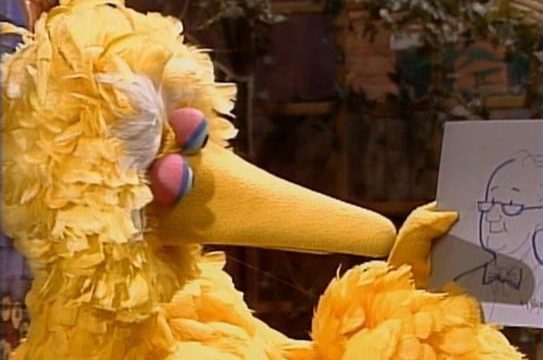Just because. —Big Bird, echoed later by Gordon
This is, crucially, not an Attention Must Be Paid article. Because I’m not writing it about Will Lee. (Though I will say enough about him to wonder why on Earth IMDb thinks we’ll know him from Little Fugitive and the original TV cast of As the World Turns but not Sesame Street.) Will Lee was, by all accounts, a kindly, gentle man who died in 1982. Mr. Hooper, on the other hand, died in 1983, his last few episodes having been filmed enough in advance that the episode about his death naturally followed; in fact, the episode where his death is shared with the audience aired on Thanksgiving Day, nearly a full year after Lee’s death on December 7—coincidentally, the day after my own sixth birthday.
By the time Mr. Hooper died, though, I already knew about death. Today, February 8, 2018, is the thirty-fifth anniversary of my father’s death. Obviously, we long since passed the point where he’d been dead more of my life than he’d been alive; we are gaining on the point at which he’ll have been dead more of my mother’s life than he’d been alive. This year, my older sister will be as old as Dad was when he died. I’ve stopped doing these kinds of calculations every year on the date of his death, but at the time that particular episode of Sesame Street aired, my grief was still fresh.
Honestly, I don’t remember seeing it in its debut. My mother has her failings, goodness knows, but she was very good at sheltering us from pop culture stuff she thought might be bad for us, that first year. (It took me many years to forgive her for not taking us to see Return of the Jedi, and I only did when I really considered the plot.) Besides, we didn’t need the lesson. But I’ve seen at least the segment when death is really explained to Big Bird many times, and I cry every single time.
When Lee died, the decision had to be reached. Would they recast? Would Mr. Hooper move to Florida? Would they just not mention what happened to him? Everyone’s instinct said no. Everyone’s instinct said to meet it head on. Children of my generation—and I’m just barely older than the children whose reactions they were considering—have grown up less likely to experience death of a loved one until we’re considerably older, but that doesn’t mean it wasn’t real and possible for us as well. Ever careful, they tested the episode on real children. 73% of four- and five-year-olds understood that Mr. Hooper was dead; 88% of those who understood also understood that it meant he wasn’t coming back.
The episode also includes a new baby, to emphasize beginnings and the cycle of life. And they didn’t ever explain what Mr. Hooper died of, because frankly, little kids don’t need that information, and it will only scare them about older loved ones to know that he basically just died of being 74. I’m pretty sure my own grandparents were already older than that, after all. But the episode is carefully crafted to explain, for example, that people die because that’s what happens, and we don’t get a choice. That dead means you’re never coming back. And the final message is that, while dead means being here one day and gone the next, being born means not being there one day and being there the next.
Even with Sesame Street‘s help, I have long had a hard time processing my grief. Some years ago, I was talking to my mother about the therapy I was in at the time, and she said she hoped I was talking about my dad in it. Which I was; of course I was. Since 1984, the eighth of February has been the rock around which the sea of my year swirls. Submerged, mostly, but it shapes so much of the rest of it. Last year, when my daughter was in the NICU, I spent the whole day terrified that her constant improvement was an illusion and she was going to suddenly die on the eighth because of course she would because it’s a terrible day that’s out to get me.
1983. For some people, it’s Scarface. Or Terms of Endearment. Flashdance. S. E. Hinton had a good year; it’s the year the films of both The Outsiders and Rumble Fish. The A-Team debuted, if that’s your speed. U2’s War album, a fine album that’s overshadowed by Joshua Tree, rightly or wrongly. Frankly, I think it was a very good year in pop culture, but that’s probably as much my age as anything else. Obviously, we of The Solute will be brushing against a fair amount of it this month.
But 1983, for me, is a landmark year and always will be. It’s the year my dad died. It’s the year Mr. Hooper died. I don’t think I’ve ever completely processed either death, given how easily they both still make me cry thirty-five years on.
I don’t actually pay for therapy; it’s covered by my insurance. But help me with a little self-care; consider supporting my Patreon!

